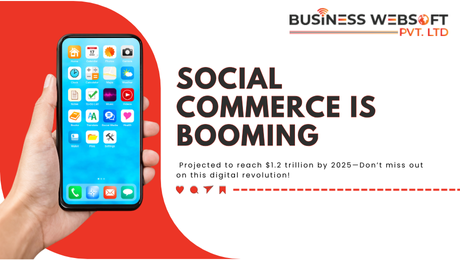Social media has significantly converted consumer purchasing behaviors. Beyond simply influencing shopping sites, it has now become an instantaneous channel for getting and promoting products.
Social Media eCommerce: The Future of Online Shopping

Social eCommerce refers to using social media systems to conduct eCommerce transactions. Projected to attain a $1.2 trillion market price by social commerce, it is quickening into one of the most compelling pieces of equipment for businesses trying to expand their digital footprint.
With almost five billion customers globally, organizations without a social media presence hazard falling at the back. While it’s for business-to-patron (B2C) manufacturers, even commercial enterprise-to-enterprise (B2B) companies are leveraging social systems like LinkedIn and YouTube to attain decision-makers and key stakeholders.
Contents:
- Social Media eCommerce—Definition
- Why Social Media eCommerce is Important
- Best Social Media Platforms for eCommerce
- Key Benefits of Social Media eCommerce
- Best Practices for Social Media eCommerce Success
Social Media eCommerce—Definition
Social media eCommerce includes the direct buying and promoting of products via social media structures. Traditionally, online shopping turned to restricted websites and 0.33-party marketplaces like Amazon and eBay. Now, systems like Facebook, Instagram, Pinterest, TikTok, and YouTube provide integrated purchasing features, permitting users to browse and purchase without leaving the app.
This combination of social engagement and product transactions creates a unique shopping revel in which logo cognizance, network building, and sales intersect seamlessly.
Why Social Media eCommerce is Important
The upward thrust of mobile devices and digitalization has significantly prompted online purchasing trends. By 2025, an estimated 12–24 million eCommerce stores will exist internationally, with social commerce contributing nearly $ 80 million within the U.S. alone.
A significant part of Gen Z, around 54%, spends about 4 hours every day on social media, exploring and shopping for products. This shift underscores the need to integrate eCommerce with social platforms to stay ahead in the marketplace.
Best Social Media Platforms for eCommerce
Each social media platform gives particular eCommerce abilities. Choosing the right one relies upon your commercial enterprise’s desires and audience.
1. Facebook & Instagram (Meta)
Meta’s platforms offer robust selling features, including:
- Facebook Shops & Instagram Shops: Custom storefronts where users can browse and buy within the apps.
- Shoppable Posts & Stories: Tag products in posts for an intuitive shopping experience.
- Facebook Marketplace: A local selling platform for physical products.
- Live Shopping: Sell products in real-time via live streams.
- Targeted Ads: Run highly targeted campaigns to reach ideal customers.
2. Snapchat
- Shoppable AR Lenses: Allow users to “try on” products using augmented reality.
- Shoppable Ads & Product Catalogs: Showcase products with in-app purchase links.
- Swipe-Up Ads: Direct users to purchase pages instantly.
3. Pinterest
- Product Pins: Display product details and direct users to external eCommerce sites.
- Shop Tab: Users can browse and discover products seamlessly.
- Pinterest Lens: A visual search tool that helps users find products.
4. YouTube
- Shoppable Ads & Merch Shelf: Display products directly below videos.
- Live Shopping: Viewers can purchase items featured in live streams.
Key Benefits of Social Media eCommerce
1. Precision Targeting with Ads
Businesses can use social media advertising to target potential customers based on demographics, interests, and behaviors, ensuring better ad performance and ROI.
2. User-Generated Content (UGC)
Encouraging customers to share their experiences enhances credibility and builds trust, leading to increased engagement and sales.
3. Influencer Marketing
Partnering with influencers allows businesses to reach a broader audience. Assigning unique promo codes and tracking links can help measure campaign effectiveness.
Best Practices to Make Social Media eCommerce Successful
- Optimize Your Social Commerce Strategy—Keep refining with time to increase conversion rates.
- Leverage Social Proof—Displays customer reviews, testimonials, and user-generated content.
- Use AI Tools—Use chatbots and AI-driven recommendations to enhance engagement.
- Engage in Real-Time—Use live streaming and quick responses to optimize customer interaction.
- Platform-Specific Strategy—Tailor content and marketing approaches to particular social media platforms.
- Mix up content formats: use images, video clips, live streams, and interactive posts.
Authenticity and transparency are aligned with the values of your brand while communicating openly with your audience.
Take Your Social Media eCommerce to the Next Level
Social media eCommerce has really changed the game. Brands now can connect closer to their target audience while creating sales. We help you optimize product listings, manage paid campaigns, and even implement full-fledged social commerce strategies—all with Business Websoft.
As a leading social media marketing agency, we help businesses like yours maximize their online potential. Contact us today to learn more about how we can elevate your social media eCommerce strategy!
